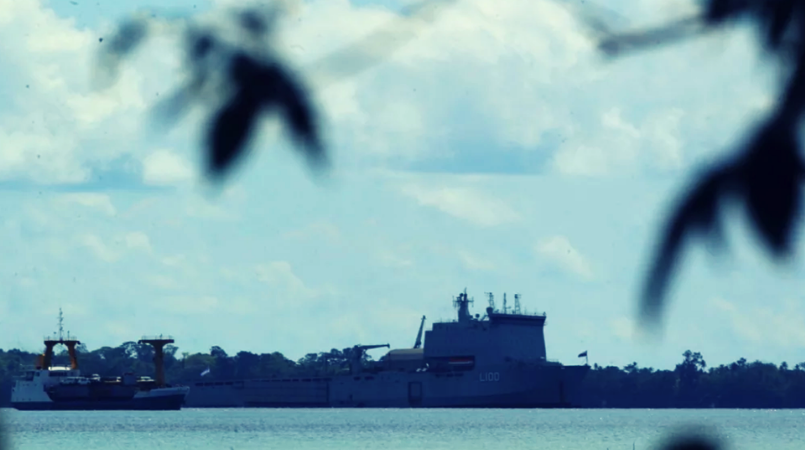
The recent decision to build a naval facility in Manus Province is the first time since 1975 that a facility housing foreign powers will be constructed in PNG, says a political science lecturer.
“The agreement to have a joint naval base on PNG territory faces a ‘democratic deficit’ because the Papua New Guinean input was never sought. The Manus naval base agreement is an example of a foreign policy strategy that does not reflect Papua New Guinean designs,” UPNG academic, Patrick Kaiku, said.
“Already, there are objections to this decision by political leaders of Manus, who feel that the people in the province were not consulted on the matter. The decision by PNG to be party to a joint naval base agreement was never debated in PNG's Parliament, even though Parliament is the highest law-making body in the land with the powers to ratify international treaties and agreements.
“The Parliamentary Committee on Foreign Affairs is inexistent and has never been allowed to consider submissions from the public on issues such as the naval base agreement.
“In previous arrangements where Australia-PNG cooperation were initiated, beginning with the 2004 Enhanced Cooperation Program and the 2013 Manus asylum-seekers program of offshore process of illegal boat-peoples into Australia, the Supreme Court in PNG belatedly ruled these bilateral agreements unconstitutional; that is, not conforming to provisions in the PNG Constitution.
“Australian engagements with PNG have an unsavoury history of bypassing initial domestic scrutiny,” continued Kaiku.
“The fact that two previous landmark bilateral arrangements between Australia and PNG were disbanded by the Supreme Court attests to deficiencies in domestic scrutiny and debate. It is more to do with how foreign relations are seen as the prerogative of the Executive. For purposes of expediency, domestic checks and balances on national positions in PNG's international commitments are bypassed. It is an efficient way of keeping Papua New Guineans passive and reliant on external forces and the all-knowing Executive arm of government.
“It may be argued that the competing powers in the Sino-American rivalry are capitalising on the weaknesses in PNG's domestic scrutiny of foreign policy and an uninformed populace to advance their own agendas.
“Without the input and constructive participation by domestic actors in PNG, our country's position on international matters will further erode democratic processes and ultimately the sovereignty of PNG. If PNG's diplomatic partners, the United States, or Australia, are serious about helping PNG build on our common values of adherence to the rule of law, or democratic participation in decision-making, the same level of expectation that American and Australian citizens demand of their respective governments has to be encouraged for PNG.
“This may mean demanding the PNG Government to show cause on the level of domestic input into a serious issue like a naval base on PNG territory. This should be the American and Australian condition for agreements on issues of grave implications to the people of PNG.
“Western countries that are governed according to democratic principles should look no further than their own political systems,” stated the lecturer.
“In Western democracies like Australia or the United States, foreign policy is an outcome of a range of alternatives, where domestic interest groups and actors are so pronounced. Non-government organisations, advocacy or lobby groups, political parties, research think-tanks wholly committed to informing foreign policy positions and a multiplicity of interest groups and individuals make the process of foreign policy-making a rigorous and sometimes protracted affair. This is the feature of political systems with established institutions and well-informed actors in the domestic arena.
“It is therefore misleading to assume that this same kind of citizenry connection to foreign policy apparatus exists in developing democracies like PNG. PNG's Parliament is dominated by the Executive. In a political system where the preoccupation of elected officials is more parochial, tribal and concerned with the immediate chores of pork-barrel politics, foreign relations is a side-show preoccupation where the Cabinet, the Prime Minister and the Ministry of Foreign Affairs have significant influence.
“Governments of Western powers in the region who wish to enlist the diplomatic support of PNG in countering other non-democratic powers ought to be mindful of the domestic dynamics of PNG's foreign policy decision-making processes, to help nurture inclusive values, rather than bypass it.
“After all, it is the same standards that citizens and interest groups in these Western democracies demand of their own governments in their own countries.”
* Patrick Kaiku teaches Diplomacy and International Relations in the Political Science Department (University of Papua New Guinea). He has been a teaching fellow in the Politics Department since 2011. Some of his views and objections to the Lombrum Naval Base agreement for Manus have featured in popular online journals such as The Diplomat (e.g. https://thediplomat.com/2018/11/non-aligned-amid-great-power-rivalry-the-case-of-papua-new-guinea/)
(Picture: Agora Dialogue)
